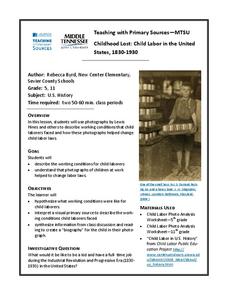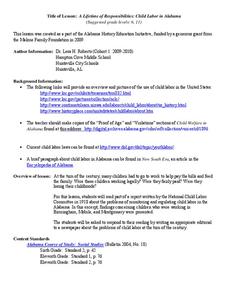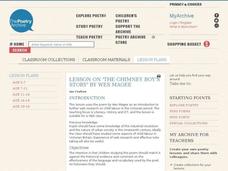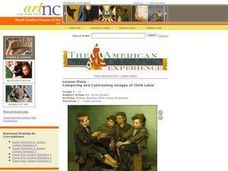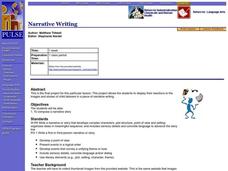Core Knowledge Foundation
Volume 2 - A History of the United States: Modern Times—Late 1800s to the 2000s
The second volume of the Core Knowledge History of the United States ebook begins by asking young scholars to consider the impact immigration, industrialization, and urbanization had on the United States in the late 1800s. The text ends...
Curated OER
Documenting Child Labor in Nepal
Fourth graders, using Apple's iMovie, create a digital documentary to raise awareness about the existing child labor in Nepal.
Curated OER
Childhood Lost: Child Labor in the United States, 1830-1930
Working in groups, middle and high schoolers describe and discuss photographs depicting working conditions experienced by child laborers in the 19th century. They then write a persuasive paragraph supporting an amendment to regulate the...
Library of Congress
Child Labor in America
Students investigate child labor during the Great Depression. In this US policy activity, students evaluate multiple layers of the social, economic, and political affects of policy during the Great Depression. Students will engage in 5...
Center for History Education
The Triangle Shirtwaist Factory Fire: Is Anyone to be Punished for This?
The stories of bodies falling to the pavement and girls dying in their seats echo to the present day. The New York City Triangle Shirtwaist Factory fire—which killed 147 people, mostly young women and girls—galvanized the labor movement...
DocsTeach
Lewis Hine Shedding Light on Child Labor through Photographs
The Industrial Revolution: long hours, low pay, and unsafe conditions. An eye-opening activity explores the darker side of industry and exposes the realities of child labor with photos. Scholars view four photos from the famous...
Center for History Education
Methods of Reform: The Lowell Mill Girls
Although the girls and women who worked in the Lowell Mills are not often seen this way, they are the forbearers of the American labor movement. Pupils examine primary sources, including testimony about life at Lowell and labor laws, as...
DocsTeach
Bibb Mill No 1 Child Labor Photograph Discussion
There's no way a child can operate heavy machinery ... right? Pupils examine a photograph of a child operating a loom at mill to learn about child labor and its impacts. Prompts provoke thoughtful discussion or fuel a writing exercise.
DocsTeach
Analyzing Photographs of the Triangle Shirtwaist Factory Fire
While a catalyst for the labor movement, 146 people lost their lives in the Triangle Shirtwaist Factory Fire in 1913. A series of photographs of the aftermath of the tragedy help young historians consider the impact of the fire. The...
DocsTeach
Analyzing a Child Labor Photograph
Sometimes images tell shocking stories. Individuals examine a Lewis Hines picture of children packing beans and consider the impact working in a factory had on their young lives. A series of prompts emailed to the teacher helps them...
EngageNY
Introducing Module 2: Working Conditions—Then and Now
Let's get visual! Scholars embark on a gallery walk around the classroom to view quotes, images, and videos about historical and modern working conditions in various professions. They consider how working conditions have changed over...
New York State Education Department
US History and Government Examination: June 2010
Just how successful were the reform movements of the ninteenth and twentieth centuries? Using documents ranging from the writings of Mother Jones to the marriage vows of Lucy Stone, individuals consider the question in a scaffolded...
Syracuse University
American Industrial Revolution
While the Industrial Revolution may have fueled America's rise to the top of world markets, the child laborers often faced dangerous conditions. Using primary source images and other information, scholars consider what these children...
Alabama Department of Archives and History
A Lifetime of Responsibilities: Child Labor in Alabama
Imagine children working long hours in factories, coal mines, and in the fields. Class members examine a series of pictures and read about early attempts to regulate child labor and current child labor laws.
Curated OER
Lord Shaftesbury
One of the negative effects of the Industrial Revolution was the advent of child labor. Discover the good deeds and law making powers held by Lord Shaftesbury. Each slide describes his life and his contributions to child welfare,...
Curated OER
Child Labor in Maryland: An Historical Investigation
Tenth graders, after reading two excerpts about contemporary child labor situations, discuss two broad questions in detail along with the industrial boom following the Civil War conditions in the United States. They investigate how the...
Curated OER
Industrial Revolution: A Definition
America sure did have a few growing pains during the Industrial Revolution. Share the problems, causes, effects, and reformation that marked the turn of the century and shift in policy during US industrialization. This slide show...
Curated OER
Lesson on 'The Chimney Boy's Story' by Wes Magee
Wes Magee's poem "The Chimney Boy's Story" about chimney sweeps/climbing boys is used as an introduction to a instructional activity that asks groups to research child labor in Victorian Britain.
Curated OER
Comparing and Contrasting Images of Child Labor
Students study child labor in the 19th century through one painting and multiple photographs. In discussion and writing, they consider the differences between photography and painting as mediums for expressing these attitudes.
Curated OER
Working for a Living: Child Labor Laws
Students research the working conditions in the late 1800's and the evolution of child labor laws. They discuss how the laws affect them today and if they are fair. They write a paper summarizing the laws and the view of the laws.
Curated OER
Narrative Writing
Imagine a day in the life of a child who has to work 12-14 hours a day, seven days a week. After viewing images and reading stories of child laborers, class members select an image and write a richly detailed narrative about a typical...
Curated OER
The Growth of the American Labor Movement
Explore the world of labor unions and organized strikes of the early 20th century in this presentation. With stark pictures of child laborers and striking workers, these slides are sure to leave an indelible impression on your students-...
Curated OER
The Industrial Revolution
Students explore what life was like during the Industrial Revolution. In this United States History lesson, students analyze a specific job then complete a webquest about that job. Once their research is complete, students...
Curated OER
Child Labor in the Carolinas
Fifth graders explore child labor and how children were exploited and used in the work place. In this Industrial Revolution lesson, 5th graders research child labor by reading, looking at photographs and drawing conclusions...




